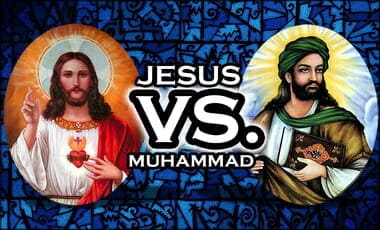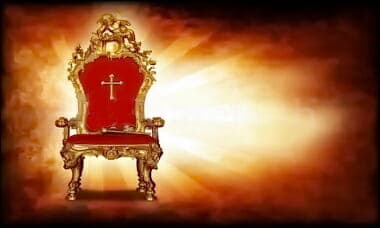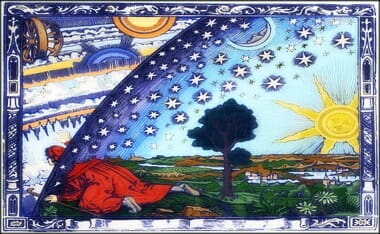The rest of this book will be concerned with the biblical material relating to the Trinity, considering the arguments advanced by JWs to show that it is unbiblical.
We begin with the biblical teaching that there is one God. The JWs affirm that monotheism is the biblical teaching (p. 12), citing several Scriptures in support (p. 13). And trinitarians could not agree more. There is only one God, and this God is one. The oneness of God is the first plank in the trinitarian platform. For this reason I would agree with the booklet’s argument that the plural form elohim for God in the Old Testament cannot be evidence of the Trinity (pp. 13-14).
The Trinity and the Oneness of God
But two problems need attention. First, JWs claim that the Bible’s affirmations of monotheism mean “that God is one Person—a unique, unpartitioned Being who has no equal” (p. 13). As has already been explained, trinitarians do not regard the three persons as “partitions” of God, or the Son and Spirit as beings outside God yet equal to him. Indeed, if “person” is defined to mean an individual personal being, then trinitarians will agree that in that sense “God is one Person.” Thus, in arguing as if these truths contradicted the Trinity, the JWs show they have misconstrued the doctrine. In fact, that God is one “Person” in this sense does not prove that he is not also three “persons” in the sense meant by trinitarians.
Second, biblical monotheism does not simply mean that the being of the Almighty God is one being. That is true enough, but the Bible also teaches simply that there is one God. The Bible is quite emphatic on this point, repeating it often in both the Old Testament (Deut. 4:35, 39; 32:39; 2 Sam. 22:32; Isa. 37:20; 43:10; 44:6-8; 45:5, 14, 21-22; 46:9) and the New Testament (Rom. 3:30; 16:27; 1 Cor. 8:4, 6; Gal. 3:20; Eph. 4:6; 1 Tim. 1:17; 2:5; James 2:19; Jude 25). And the very meaning of the word monotheism is the belief in one God.
It is therefore important to note that the JWs flatly deny this most basic of biblical teachings. Although they admit that there is only one Almighty God, they claim that there are, in addition to that God, and not counting the many false gods worshiped by idolaters, many creatures rightly recognized in the Bible as “gods” in the sense of “mighty ones” (p. 28). These “gods” include Jesus Christ, angels, human judges, and Satan. The JWs take this position to justify allowing the Bible to call Jesus “a god” without honoring him as Jehovah God.
The question must therefore be asked whether Witnesses can escape the charge that they are polytheists (believers in many gods). The usual reply is that while they believe there are many gods, they worship only one God, Jehovah. But this belief is not monotheism, either. The usual term for the belief that there are many gods but only one who is to be worshiped is heno theism.
The more important question, of course, is whether the Bible supports the JWs’ view. The explicit, direct statements of the Bible that there is only one God (cited above) cannot fairly be interpreted to mean that there are many gods but only one who is almighty, or only one who is to be worshiped, or only one who is named Jehovah. There is only one Almighty God Jehovah, and he alone is to be worshiped—but the Bible also states flatly that he is the only God.
More precisely, the Bible says that there is only one true God (John 17:3; see also 2 Chron. 15:3; Jer. 10:10; 1 Thess. 1:9; 1 John 5:20), in contrast to all other gods, false gods, who are not gods at all (Deut. 32:21; 1 Sam. 12:21; Ps. 96:5; Isa. 37:19; 41:23-24, 29; Jer. 2:11; 5:7; 16:20; 1 Cor. 8:4; 10:19-20). There are, then, two categories of “gods”: true Gods (of which there is only one, Jehovah) and false gods (of which there are unfortunately many).
The JWs, however, in agreement with most antitrinitarian groups today that claim to believe in the Bible, cannot agree that there is only one true God, despite the Bible’s saying so in just those words, because then they would have to admit that Jesus is that God. Therefore, they appeal to a few isolated texts in the Bible that they claim honor creatures with the title gods without implying that they are false gods. We must next consider these texts briefly.
Are Angels Gods?
There are two kinds of creatures that the JWs claim are honored as gods in Scripture—angels and men. We begin with angels. The usual prooftext in support of this claim is Psalm 8:5, which the NWT renders, “You also proceeded to make him [man] a little less than godlike ones.” The word translated “godlike ones” here is elohim, the usual word for “God,” but (because plural) also translatable as “gods.” Since Hebrews 2:7 quotes this verse as saying, “You made him a little lower than angels” (NWT), the Witnesses conclude that Psalm 8:5 is calling angels “gods.”
There are numerous objections to this line of reasoning, only some of which can be mentioned here. First, it is questionable that in its original context elohim in Psalm 8:5 should be understood to refer to angels and translated “gods” or “godlike ones.” This is because in context this psalm is speaking of man’s place in creation in terms that closely parallel Genesis 1. Psalm 8:3 speaks of the creation of the heavens, moon, and stars (cf. Gen. 1:1, 8, 16). Verse 4 asks how God can consider man significant when compared with the grandeur of creation. The answer given is that man rules over creation—over the inhabitants of the land, sky, and sea (vv. 6-8; cf. Gen. 1:26-28). What links this question and answer in Psalm 8 is the statement that God made man “a little lower than elohim,” which parallels in thought the Genesis statement that man was created “in the image of elohim,” that is, in the image of God (Gen. 1:26-27). This makes it quite reasonable to conclude that in its own context Psalm 8:5 is meant to be understood as saying that man is a little lower than God, not angels.
If this view is correct, why does Hebrews 2:7 have the word angels rather than God? The simple answer is that the author of Hebrews was quoting from the Septuagint, a Greek translation of the Old Testament prepared by Jewish scholars and in common use in the first century. The fact that the writer of Hebrews quoted the Septuagint does not imply that the Septuagint rendering he quoted was a literal or accurate word-for-word translation of the Hebrew text (after all, “angels” is certainly not a literal translation of “gods”). Rather, Hebrews 2:7 is a paraphrase of Psalm 8:5 that, while introducing a new understanding of it, does not contradict it. Psalm 8 says that the son of man (meaning mankind) was made a little lower than God; Hebrews 2 says that the Son of Man (meaning Christ) was made a little lower than the angels. The psalm speaks of man’s exalted status, while Hebrews speaks of Christ’s temporary humbling. Since the angels are, of course, lower than God, and since Christ’s humbled status was that of a man, what Hebrews says does not contradict Psalm 8:5, though it does go beyond it.
It must be admitted that this is not the only way of reading Hebrews 2:7 and Psalm 8:5. It is just possible that Hebrews 2:7 does implicitly understand Psalm 8:5 to be calling angels “gods.” If this were correct, it would not mean that angels were truly gods. It might then be argued that the point of Psalm 8:5 was that man was made just a little lower than the spiritual creatures so often wrongly worshiped by men as gods. This would fit the context of Hebrews 2:7 also, since from Hebrews 1:5 through the end of chapter 2 the author argues for the superiority of the Son over angels. That is, Hebrews might be taken to imply that even God’s angels can be idolized if they are wrongly exalted or worshiped as gods (which some early heretics were doing [cf. Col. 2:18]).
Moreover, this interpretation would also fit Hebrews 1:6, which quotes Psalm 97:7 as saying that all of God’s angels should worship the Son. Psalm 97:7 in Hebrew is a command to the “gods” (identified in the immediate context as idols) to worship Jehovah. Thus, Hebrews 1:6 testifies at once both to the fact that angels, if they are considered gods at all, are false gods, and that Jesus Christ is worshiped by angels as Jehovah the true God.
There are other reasons for denying that angels are truly gods in a positive sense. The Bible flatly states that demonic spirits are not gods (1 Cor. 10:20; Gal. 4:8). Since demons are just as much spirits, and presumably are just as much “mighty ones” (though wicked) as the holy angels, it follows that angels cannot be gods by virtue of their being “mighty ones. “
Furthermore, the translation of elohim in Psalm 8:5 as “godlike ones” runs into the problem of contradicting the Bible, which flatly and repeatedly states that none are like God (Exod. 8:10; 9:14; 15:11; 2 Sam. 7:22; 1 Kings 8:23; 1 Chron. 17:20; Ps. 86:8; Isa. 40:18, 25; 44:7; 46:5, 9; Jer. 10:6-7; Mic. 7:18), though creatures may reflect God’s moral qualities (Rom. 8:29; Eph. 4:24; Col. 3:10; 2 Peter 1:4; 1 John 3:2).
Finally, even if angels were gods in some positive sense, that would not explain in what sense Jesus Christ is called “God,” since he is not an angel—he is God’s Son (Heb. 1:4-5); is worshiped by all the angels (Heb. 1:6); is the God who reigns, not a spirit messenger (Heb. 1:7-9); and is the Lord who created everything, not an angel created to serve (Heb. 1:10-13).
Before leaving this question, it should be noted in passing that Satan is called “the god of this age” (2 Cor. 4:4 Niv), but clearly in the sense of a false god, one who is wrongly allowed to usurp the place of the true God in the present age. That is the point of 2 Corinthians 4:4, not that Satan is a mighty one.
Are Mighty Men Gods?
The Witnesses claim that not only mighty angels, but also mighty men, are called “gods” in Scripture in recognition of their might. This claim, however, is open to even more difficult objections than the claim that angels are gods.
The Bible explicitly denies that powerful men, such as kings and dictators and military leaders, are gods (Ezek. 28:2, 9; see also Isa. 31:3; 2 Thess. 2:4). In fact, frequently in Scripture “man” and “God” are used as opposite categories, parallel with “flesh” and “spirit” (Num. 23:19; Isa. 31:3; Hos. 11:9; Matt. 19:26; John 10:33; Acts 12:22; 1 Cor. 14:2). In this light, texts that are alleged to call men “gods” in a positive sense ought to be studied carefully and alternative interpretations followed where context permits.
The usual text cited in this connection, as in the JW booklet, is Psalm 82:6, “I said, you are gods,” which is quoted by Jesus in John 10:34. This verse has commonly been interpreted (by trinitarians as well as antitrinitarians, though with different conclusions drawn) to be calling Israelite judges “gods” by virtue of their honorable office of representing God to the people in judgment. Assuming this interpretation to be correct, the verse would not then be saying that judges really are gods in the sense of “mighty ones.” Rather, it would simply be saying that as judges in Israel they represented God. This representative sense of “gods” would then have to be distinguished from a qualitative sense, in which creatures are called “gods” as a description of the kind of beings they are.
There are good reasons, however, to think that the Israelite judges are being called “gods” not to honor them but to expose them as false gods. This may be seen best by a close reading of the entire psalm.
In Psalm 82:1 Jehovah God is spoken of by the psalmist in the third person: “God takes His stand… He judges…” (NAss). The psalmist says, “God [elohimi takes his stand in the assembly of God [el]; he judges in the midst of the gods [elohimr (my translation). Here we are confronted with two elohim: God, and the judges, called by the psalmist “gods.”
In verses 2-5 God’s judgment against the Israelite judges is pronounced. They are unjust, show partiality to the wicked, allow the wicked to abuse the poor and helpless, and by their unjust judgment are destroying the foundations of life on earth.
Then in verse 6 we read, “I said, ‘You are gods….‘” This is a reference back to the psalmist’s calling the judges “gods” in verse 1: “…He judges in the midst of the gods.” The succeeding lines make clear that although the psalmist referred to the wicked judges as “gods,” they were not really gods at all and proved themselves not up to the task of being gods. This is made clear in two ways.
First, the second line of verse 6 adds, “And all of you are sons of the Most High.” What can this mean? The similar expression “sons of God” is used in the Old Testament only of angels (Gen. 6:2, 4; Job 1:6; 2:1), unless one interprets Genesis 6:1-4 to be speaking of a godly line of men. The Israelite judges were neither angels nor godly men. Hosea 1:10 speaks prophetically of Gentiles becoming “sons of the living God,” but this has reference to Gentiles becoming Christians and thus adopted children of God (Rom. 9:26). The judges were not Christians, either. The easiest, if not only, explanation is that they are called “sons of the Most High” in irony. That is, the psalmist calls them “sons of the Most High” not because they really were, but because they thought of themselves as such, and to show up that attitude as ridiculous (see a similar use of irony by Paul in 1 Cor. 4:8). If this is correct, it would imply that they were also called “gods” in irony. Thus the thought would be that these human judges thought of themselves as gods, immortal beings with the power of life and death.
The next lines, in Psalm 82:7, confirm such an interpretation: the judges are told that they are ordinary men who will die. The clear implication is that though they seemed to rule over the life and death of their fellow Israelites, they were no more gods than anyone else, because—like even the greatest of men—they will die.
Then, in verse 8, the psalmist addresses God in the second person, “Arise, 0 God, judge the earth!…” (NASB). In other words, the judges have proved themselves to be false gods; now let the true God come and judge the world in righteousness.
This way of reading Psalm 82 does not conflict with or undermine Christ’s argument in John 10:34-36. When he says, “If he called them gods, to whom the word of God came…” (John 10:35 NASB), nothing in the text demands that the “gods” be anything but false gods. Jesus’ argument may be paraphrased and expanded as follows:
Is it not written in the Law which you call your own, “I said, `You are gods”? The psalmist, whom you regard as one of your own, and yourselves as worthy successors to him, called those wicked judges, against whom the word of God came in judgment, “gods.” And yet the Scripture cannot be broken; it must have some fulfillment. Therefore these worthless judges must have been called “gods” for a reason, to point to some worthy human judge who is rightly called God. Now the Father has witnessed to my holy calling and sent me into the world to fulfill everything he has purposed. That being so, how can you, who claim to follow in the tradition of the psalmist, possibly be justified in rejecting the fulfillment of his words by accusing me of blasphemy for calling myself the Son of God? How can you escape being associated with those wicked judges who judged unjustly by your unjust judgment of me?
By this interpretation, Jesus is saying that what the Israelite judges were called in irony and condemnation, he is in reality and in holiness; he does what they could not do and is what they could not be. This kind of positive fulfillment in Christ contrasted with a human failure in the Old Testament occurs elsewhere in the New Testament, notably the contrast between the sinner Adam and the righteous Christ (Rom. 5:12-21; 1 Cor. 15:21-22, 45).
To summarize, the judges called “gods” in Psalm 82 could not have been really gods, because the Bible denies that mighty or authoritative men are gods. If they are called “gods” in a positive sense, it is strictly a figurative expression for their standing in God’s place in judging his people. But more likely they are called “gods” in irony, to expose them as wicked judges who were completely inadequate to the task of exercising divine judgment. However one interprets Psalm 82, then, there is no basis for teaching that there are creatures who may be described qualitatively as gods.
We conclude, then, that the biblical statements that there is only one God are not contradicted or modified one bit by the prooftexts cited by JWs to prove that creatures may be honored as gods. There is one Creator, and all else is created; one Eternal, and all else temporal; one Sovereign Lord, and all else undeserving servants; one God, and all else worshipers. Anything else is a denial of biblical monotheism.
Robert M. Bowman, Why You Should Believe In The Trinity: An Answer to Jehovah’s Witnesses (Grand Rapids, MI: Baker Books, 1997), 49-58.





























